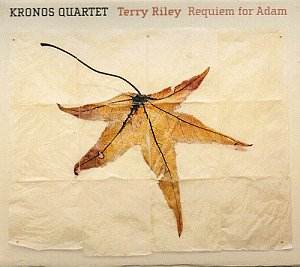It is indeed a sobering thought to realise that those
great founding-fathers of American minimalism, Steve Reich, La Monte
Young and Terry Riley, are all well into their middle sixties. With
his seminal masterpiece In C (1964), Riley effectively set in
motion a movement that is still reverberating through the contemporary
music scene, and this present issue gives us a chance to see what stage
his compositional processes have reached.
Riley has, like so many other composers, worked with
and been inspired by Kronos for over twenty years, their relationship
stretching back to teaching days in Mills College, Oakland, California.
Unfortunately the main work on this disc, Requiem for Adam, was
borne out of personal grief and tragedy. Adam Harrington was the 16
year old son of Kronos’s leader David Harrington and died of heart failure
while walking with his family on Mt. Diablo in 1996. Riley had known
Adam since he was a small boy and obviously felt the pain as acutely
as anybody, so when the idea of a commission in his memory was mooted,
Riley admits he found it ‘very difficult to get started', but that ‘when
you lose a person close to you, the best thing is to put something in
that person’s place, to make an affirmation that life goes on’. The
resulting work is both a heartfelt memorial and a celebration of ‘the
pulsations of a young life’. In fact this is the third in a series of
‘requiems’ written to commemorate the deaths of people close to him,
and whilst this in itself does not guarantee a masterpiece, the personal
dimension to this work has, I think, softened those aggressive edges
that minimalism can have, into something deeply engaging.
Rhythmic cells and small melodic pattern ‘phases’ are
still evident, but the sheer warmth of the harmonies and almost voluptuous
nature of the string writing take us into another dimension. Like many
other composers, he likes taped collages of ‘sound’ to co-exist with
the live instruments, in this case in the second movement, where electronic
percussion, gongs and bells give a suitably ‘processional’ feel. I have
to admit to preferring the outer movements, where the Kronos are simply
left to play the notes, and here Riley shows us a composer really plying
his craft, the material both memorable and moving. In fact the closing
coda, cleverly using a two-note motive from the opening and representing
the two syllables of Adam’s name, not only shows us the ‘full circle’
of life, but that art created out of suffering can be both consolatory
and uplifting.
After sharing this moving forty-two minute journey,
the tiny tailpiece almost seems unnecessary. It does have a link in
that it is another memorial in sound (in this case to Riley’s philosophical
and spiritual mentor, Pandit Pran Nath), but this time we get a spontaneous
piano improvisation. At a live concert this would undoubtedly be effective,
but for repeated listening it simply comes across as a ‘doodle’, the
sort of thing Keith Jarrett does much more effectively (the opening
‘riff ‘ even has an echo of Jarrett’s La Scala concert). Devotees of
Riley will no doubt enjoy hearing him at the piano, but after the weight
and substance of the Requiem, I can take or leave this.
Production values, as ever with Nonesuch, are exemplary;
liner notes, recording quality and (needless to say in this case) performances,
are all ideal. As the minimalists grow older and become what is now
being termed ‘maximalists’ (your guess is as good as mine), the resulting
warmth and passion, qualities not easily discerned in their early work,
can only be a cause for celebration.
Tony Haywood


